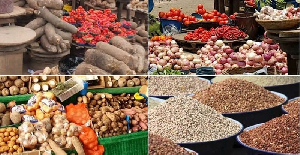 INSLA has called for robust actions in the implementation of food safety policies | File Photo
INSLA has called for robust actions in the implementation of food safety policies | File Photo
The Institute of Leadership and Development (INSLA) has joined the globe to observe the 2025 World Food Safety Day with a call on the government for robust actions in the implementation of the National Food Safety Policy.
It also urged the Food and Drugs Authority to seriously implement the regulatory frameworks of the policy and carry out mass public awareness to bring everyone to speedily prioritise food safety.
The theme for this year’s Day was “Food Safety: Science in Action.”
The theme highlights how crucial scientific investigation, creativity, and cooperation were to prevent foodborne illnesses, promoting sustainable development, and fostering trust in food supply chain.
It was also to emphasize the vital role that science plays in guaranteeing that everyone has access to safe food.
A statement signed by Ms Mary Yayra Kpogo, Programme/Operation Officer of INSLA and copied to the Ghana News Agency said according to the World Health Organisation (WHO, contaminated food causes 200 diseases, ranging from diarrhoea to cancers.
“Every day, an average of 1,600,000 people become ill because of hazardous food. The annual economic burden of foodborne infections in low and middle-income nations is US$110 billion,” the WHO stated.
The statement said safe food was essential for maintaining good health, preventing chronic diseases, and promoting sustainable development, adding, “Food safety is a critical component of food security, which is essential for achieving the United Nations’ Sustainable Development Goals.”
Mr Benjamin Anabila, the Director of INSLA emphasized the need for governments, industry stakeholders, and consumers to work together to harness the latest scientific research and innovations to ensure safe food for all.
He mentioned some of the measures that could be undertaken to enhance food safety as funding scientific research studies on food safety that could help better understand the causes of foodborne illnesses and develop effective prevention strategies.
Others are Improving and developing advanced detection methods that could help identify contaminants and pathogens in food more quickly and accurately.
Developing innovative technologies, such as smart packaging and tracing systems to help track food products and prevent contamination and enhance food safety regulations through science-based regulations and policies to ensure that food products meet safety standards and reduce the risk of foodborne illnesses.
The rest are ensuring collaboration among scientists, policymakers, industry stakeholders, and consumers to help advance food safety through the sharing of knowledge, resources, and best practices.
That educating consumers about food safety practices and the importance of handling food safely could help prevent foodborne illnesses.
Anabila said the INSLA remained committed to working with government agencies, civil society, healthcare providers, educators, and the media to strengthen advocacy, build institutional capacity, and promote a healthy and safer environment.
“Together we can advance Ghana’s commitment to achieving Sustainable Development Goal 3 (Good Health and Well-being) by taking charge of our lives and ensuring that the food they consume is safe for consumption and not contaminated,” he stated
He said, “Let us remember that science is the foundation of food safety. By harnessing the latest research, technologies, and innovations, we can ensure safe food for all and promote sustainable food systems.”
